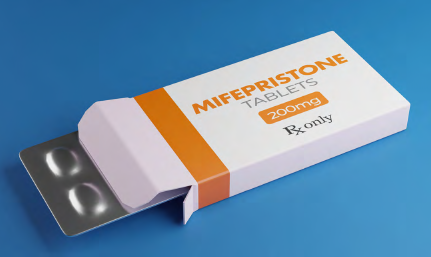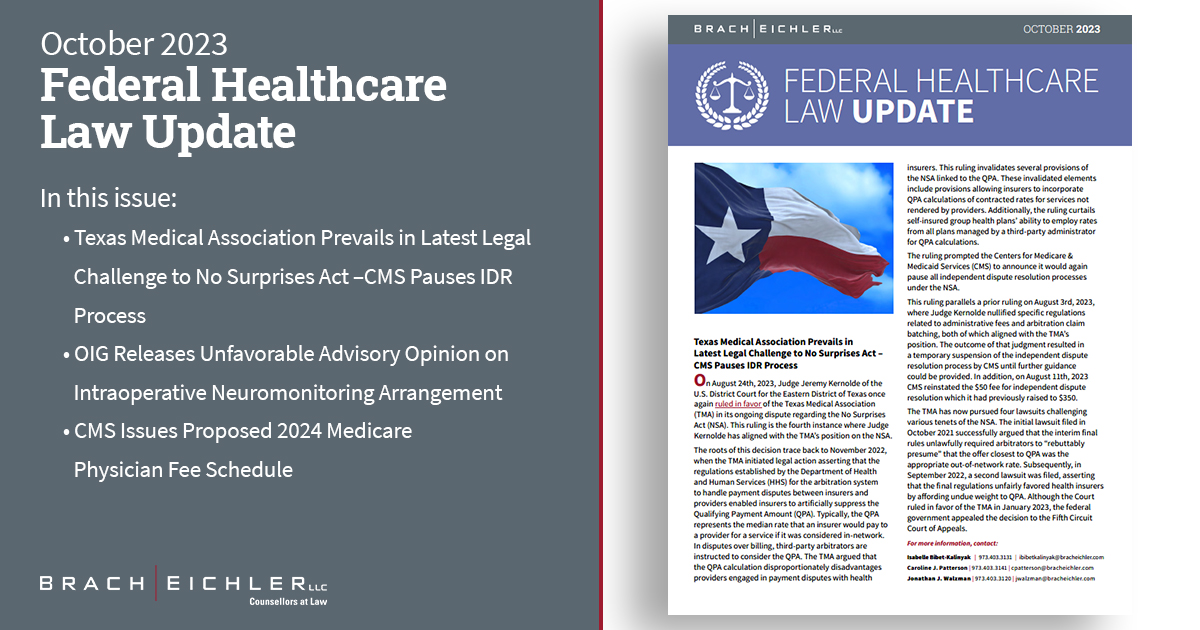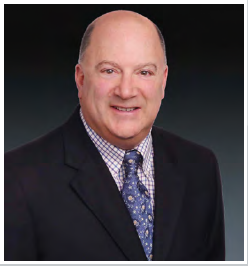

On August 24th, 2023, Judge Jeremy Kernolde of the U.S. District Court for the Eastern District of Texas once again ruled in favor of the Texas Medical Association (TMA) in its ongoing dispute regarding the No Surprises Act (NSA). This ruling is the fourth instance where Judge Kernolde has aligned with the TMA’s position on the NSA. The roots of this decision trace back to November 2022, when the TMA initiated legal action asserting that the regulations established by the Department of Health and Human Services (HHS) for the arbitration system to handle payment disputes between insurers and providers enabled insurers to artificially suppress the Qualifying Payment Amount (QPA). Typically, the QPA represents the median rate that an insurer would pay to a provider for a service if it was considered in-network. In disputes over billing, third-party arbitrators are instructed to consider the QPA. The TMA argued that the QPA calculation disproportionately disadvantages providers engaged in payment disputes with health
insurers. This ruling invalidates several provisions of the NSA linked to the QPA. These invalidated elements include provisions allowing insurers to incorporate QPA calculations of contracted rates for services not rendered by providers. Additionally, the ruling curtails self-insured group health plans’ ability to employ rates from all plans managed by a third-party administrator for QPA calculations.
The ruling prompted the Centers for Medicare & Medicaid Services (CMS) to announce it would again pause all independent dispute resolution processes under the NSA.
This ruling parallels a prior ruling on August 3rd, 2023, where Judge Kernolde nullified specific regulations related to administrative fees and arbitration claim batching, both of which aligned with the TMA’s position. The outcome of that judgment resulted in a temporary suspension of the independent dispute resolution process by CMS until further guidance could be provided. In addition, on August 11th, 2023 CMS reinstated the $50 fee for independent dispute resolution which it had previously raised to $350.
The TMA has now pursued four lawsuits challenging various tenets of the NSA. The initial lawsuit filed in October 2021 successfully argued that the interim final rules unlawfully required arbitrators to “rebuttably presume” that the offer closest to QPA was the appropriate out-of-network rate. Subsequently, in September 2022, a second lawsuit was filed, asserting that the final regulations unfairly favored health insurers by affording undue weight to QPA. Although the Court ruled in favor of the TMA in January 2023, the federal government appealed the decision to the Fifth Circuit Court of Appeals.
For more information, contact:
Isabelle Bibet-Kalinyak | 973.403.3131 | ibibetkalinyak@bracheichler.com
Caroline J. Patterson | 973.403.3141 | cpatterson@bracheichler.com
Jonathan J. Walzman | 973.403.3120 | cjwalzman@bracheichler.com
On August 18, 2023, the Department of Health and Human Services Office of Inspector General (OIG) issued an unfavorable Advisory Opinion No. 23-05 regarding an intraoperative neuromonitoring (IONM) arrangement. The OIG reviewed a proposed arrangement between an existing IONM provider (the Requestor), a physician practice which provides neurology services (the Practice), and surgeons who require the IONM services for their patients (the Surgeons), where the Surgeons would establish, own, and operate a new company to provide IONM services (NewCo). The Requestor would assist the Surgeons in establishing and operating NewCo, but neither the Requestor nor the Practice would have an ownership interest in NewCo.
Under the existing arrangement between the Requestor and the Surgeons, when the Surgeons perform surgeries requiring IONM services, they engage the Requestor to provide those services. The Requestor bills for the technical component of the IONM services and the Practice bills for the professional component of the IONM services. Under the proposed arrangement, when the Surgeons perform surgeries requiring IONM services, they would refer the patients to NewCo to provide those services. The Requestor would provide NewCo with billing and other administrative services pursuant to a billing services agreement between NewCo and the Requestor and the Practice would provide neurologists and neurophysiologists (leased by the Requestor to the Practice) pursuant to a personal services agreement between Newco and the Practice. The Requestor would attempt to ensure that no referrals to NewCo would be made for patients enrolled in government health care programs in order to abide by the Federal Anti-Kickback Statute (AKS).
The OIG found that the proposed arrangement would generate prohibited remuneration under the AKS and thus be grounds for sanctions if the requisite intent is present. The AKS makes it a criminal offense to knowingly and willfully offer, pay, solicit, or receive any remuneration to induce, or in return for, the referral of an individual to a person for the furnishing of, or arranging for the furnishing of, any item or service reimbursable under a Federal health care program. The AKS has established safe harbor exceptions, which allow for certain arrangements even though they would on their face violate the AKS. The OIG determined that the proposed arrangement involves
remuneration which would induce the Surgeons to make referrals to NewCo when payment could be made by a Federal health care program. Furthermore, the OIG found that the proposed arrangement does not fit squarely within any of the safe harbor exceptions.

In particular, the OIG found the proposed arrangement problematic under the AKS because it enables the Surgeons and the Requestor to do indirectly what they could not do directly: pay the Surgeons a share of the profits from their referrals for IONM services that could be reimbursable by a Federal health care program. The OIG emphasized that the proposed arrangement exhibits many attributes of problematic contractual joint ventures (See OIG’s Special Advisory Bulletin on Contractual Joint Ventures), about which the OIG has expressed longstanding and continuing concerns, specifically:
“A health care provider in one line of business (hereafter referred to as the “Owner”) expands into a related health care business by contracting with an existing provider of a related item or service (hereafter referred to as the “Manager/Supplier”) to provide the new item or service to the Owner’s existing patient population, including Federal health care program patients. The Manager/Supplier not only manages the new line of business, but may also supply it with inventory, employees, space, billing, and other services. In other words, the Owner contracts out substantially the entire operation of the related line of business to the Manager/Supplier—otherwise a potential competitor—receiving in return the profits of the business as remuneration for its Federal program referrals.”
Much like the OIG’s example above, the proposed arrangement would allow the Surgeons to profit from their referrals to NewCo for IONM services while taking little to no risk since the Surgeons control the flow of business to NewCo and the business operations are contracted out to the Requestor. Through the proposed
arrangement, NewCo could effectively push the Requestor out of the market as an independent supplier of IONM services. The OIG did not view the proposed arrangement’s carve out of Federal health care program beneficiaries as a way to eliminate the risk of fraud and abuse as the OIG has longstanding concerns about arrangements under which parties carve out referrals of Federal health care program beneficiaries from otherwise questionable financial arrangements.
For more information, contact:
John D. Fanburg, Chair | 973.403.3107 | jfanburg@bracheichler.com
Edward Hilzenrath | 973.403.3114 | ehilzenrath@bracheichler.com
Carol Grelecki | 973.403.3140 | cgrelecki@bracheichler.com

On July 13, 2023, the Centers for Medicare & Medicaid Services (CMS) released its proposed 2024 Medicare physician fee schedule (MFPS). The proposed MFPS introduces multifaceted measures to address health equity, new payment policies for various services, and expanded behavioral health access. The proposed changes reflect CMS’s dedication to improving care quality and accessibility while incorporating valuable input from diverse communities and healthcare practitioners. Highlights of the proposed MFPS include:
• a reduction of the conversion factor by 3.34% for 2023, from $33.89 down to $32.75 due to the expiration of the 2.5% statutory payment increase for 2023, a 1.25% statutory payment increase for 2024, and a 2.17% budget-neutrality reduction.
• a proposal to maintain the definition of “substantive portion” of an E/M service performed by both a physician and non-physician practitioner such as a physician assistant. Clinicians who furnish a split visit will continue to have a choice of history, physical exam, medical decision making, or more than half of the total time spent to define the substantive portion to determine which practitioner will bill the visit.
• a new process for adding, removing, and changing codes for telehealth services, in addition to creating differential payments based on the place of service.
• increased access to behavioral health services by creating new benefit categories under Medicare Part B. Stakeholders may submit comments to the proposed MFPS by September 11, 2023.
For more information, contact:
Isabelle Bibet-Kalinyak | 973.403.3131 | ibibetkalinyak@bracheichler.com
Edward J. Yun | 973.364.5229 | eyun@bracheichler.com
Joseph M. Gorrell | 973.403.3112 | jgorrell@bracheichler.com
On July 14, 2023, the U.S. Department of Justice (DOJ) announced that NextGen Healthcare Inc. (NextGen), an electronic health record (EHR) technology vendor, entered into a settlement agreement with the DOJ to pay $31 million to resolve allegations that NextGen violated the False Claims Act (FCA) by misrepresenting the capabilities of its EHR software and the federal Anti-Kickback-Statute (AKS) by paying remuneration to customers to induce referrals of NextGen’s EHR software.
Pursuant to the American Recovery and Reinvestment Act of 2009, the U.S. Department of Health and Human Services (HHS) makes incentive payments to certain health care providers that utilize certified EHR technology and meet certain criteria relating to their use of the technology. The DOJ alleged that NextGen violated the FCA, which prohibits anyone from knowingly submitting, or causing to be submitted, false claims to the U.S. government, by falsely obtaining certification for its software under the 2014 Edition certification criteria published by the HHS’s Office of the National Coordinator. According to the DOH, NextGen relied on an auxiliary product designed only to perform
the certification test scripts, which concealed that NextGen’s EHR lacked critical functionality. As a result, NextGen’s EHR did not include certain required functions. The DOJ also alleged that NextGen violated the AKS, which prohibits anyone from offering or paying, directly or indirectly, any remuneration to induce referrals of items or services covered by Medicare, Medicaid, and other federally funded programs. According to the DOJ, NextGen knowingly gave credits in amounts up to $10,000 and tickets to sporting events and entertainment to current customers if their recommendation of NextGen’s EHR software led to a new sale.
For more information, contact:
Isabelle Bibet-Kalinyak | 973.403.3131 | ibibetkalinyak@bracheichler.com
Keith J. Roberts | 973.364.5201 | kroberts@bracheichler.com
Caroline J. Patterson | 973.403.3141 | cpatterson@bracheichler.com
On July 25, 2023, the Biden administration proposed a new rule to strengthen mental and physical health care parity requirements and improve mental health care access. The proposed rule would reinforce the Mental Health Parity and Addiction Equity Act of 2008 (MHPAEA) and would require insurance providers to update health plans to provide equivalent access for mental health and substance abuse benefits as compared to physical health benefits.
Under the proposed rule, insurers would be required to update health plans that are found to provide inadequate access to mental health care. A comprehensive evaluation would be conducted to compare access to mental health and substance use benefits with access to physical health benefits. The evaluation would include assessing the health plan’s provider network, out-of-network payment rates, prior authorization requirements, and authorization denial rates. Plans that fail to meet applicable requirements would need to be modified to improve access to mental health care, such as by including more mental health professionals in their networks or streamlining
administrative processes. The proposed rule also clarifies certain limitations and allowances for health plans concerning mental health care and includes specific examples to ensure that health plans do not
use more restrictive prior authorization and medical management techniques, or narrower networks for mental health and substance use disorder benefits compared to medical physical health.
By addressing existing loopholes, such as requiring non-federal governmental health plans to comply with MHPAEA, the proposed rule aims to provide critical protections to an additional 90,000 consumers. These actions are part of the Biden administration’s broader efforts to tackle the mental health care crisis, including advancing access to services in Medicare, enhancing crisis response services, and providing mental health services in schools.
For more information, contact:
Lani M. Dornfeld, CHPC | 973.403.3136 | ldornfeld@bracheichler.com
Richard Robins | 973.447.9663 | rrobins@bracheichler.com
Riza I. Dagli | 973.403.3103 | rdagli@bracheichler.com

On August 16, 2023, the Fifth Circuit Court of Appeals in New Orleans issued a ruling on the appeal of a lower court’s decision regarding the validity of the U.S. Food & Drug Administration’s (FDA) approval and regulation of the prescription drug Mifepristone. In 2020, the FDA approved the use of Mifepristone in medical abortions. Since Mifepristone’s approval, the FDA has relaxed regulations concerning how it may be dispensed and subsequently approved a generic version. The Justice Department appealed the United States District Court for the Northern District of Texas ruling of April 7, 2023, which issued a nationwide injunction on the FDA’s approval of Mifepristone and ruled that the FDA’s regulation of the drug was improper. The Court of Appeals held that the FDA’s approval of Mifepristone

remains valid. The Court found that the challenge to the FDA’s approval was too late as the statute of limitations had run. Therefore, Mifepristone remains an approved FDA drug. However, the Court of Appeals did uphold parts of the District Court’s ruling regarding regulating the use of the drug, specifically that it may not be prescribed ab initio via telehealth or by mail but, may be prescribed via telehealth after an in-person visit and within the first seven weeks of pregnancy.
The U.S. Supreme Court had previously issued an administrative stay on the District Court’s decision in April of 2023, which put a hold on any decisions made by the lower courts regarding the use of Mifepristone. Therefore, despite the Court of Appeals’ ruling, until the matter is ruled on by the U.S. Supreme Court, Mifepristone will maintain its FDA approval and may be prescribed in compliance with the FDA’s previously approved regulations.
For more information, contact:
Isabelle Bibet-Kalinyak | 973.403.3131 | ibibetkalinyak@bracheichler.com
Carol Grelecki | 973.403.3140 | cgrelecki@bracheichler.com
Caroline J. Patterson | 973.403.3141 | cpatterson@bracheichler.com
The Health Care Price Transparency Act (H.R. 4822) advanced out of the U.S. House Representatives, Ways and Means Committee on July 24, 2023. The proposed legislation would require hospitals to inform patients of the cost of certain hospital items and services before receiving them. It would also codify the Centers for Medicare & Medicaid Services’ Hospital Price Transparency Rule, which includes requirements that hospitals post a machine-readable file of their standard charges and provide a list of at least 300 shoppable services.

The Chronic Kidney Disease Improvement in Research and Treatment Act (H.R. 5027) was reintroduced on July 27, 2023 in the U.S. House of Representatives. The proposed legislation would bolster initiatives for preventing Chronic Kidney Disease (CKD) by guaranteeing appropriate reimbursement for quality care. It would enhance patient access to cutting-edge drugs, technology, and advancements in kidney care. The proposed legislation includes provisions to enhance CKD screening through Medicare’s annual wellness benefit, provide education resources in dialysis facilities, encourage innovation by requiring long-term payment pathways for new medical advancements, and address dialysis infrastructure and workforce challenges. Additionally, it would widen patient options and coverage by ensuring access to Medigap policies for those with kidney failure.
For more information, contact:
John D. Fanburg, Chair | 973.403.3107 | jfanburg@bracheichler.com
Edward Hilzenrath | 973.403.3114 | ehilzenrath@bracheichler.com
Vanessa Coleman | 973.364.5208 | vcoleman@bracheichler.com

Twenty five attorneys at Brach Eichler LLC have been selected by their peers for inclusion in The Best Lawyers in America© 2024. Additionally, fifteen Brach Eichler attorneys have been selected to the publication’s “Ones to Watch” category, recognizing up-and-coming young lawyers. Brach Eichler has six new Best Lawyers on the list this year including Lindsay Cambron, Riza Dagli, Alois Habjan, Jeffrey Itzkowitz, Isabelle Bibet-Kalinyak, and Caroline Patterson as well as six attorneys on the Ones to Watch list, including Vanessa Coleman, Paul DeMartino, Andrew Macklin, Kristen Marinaccio, Michael Spizzuco, and Edward Yun.
On August 6, 2023 NJ.com highlighted Brach Eichler attorneys for taking the field in a softball tournament to support Greater Newark Fresh Air Fund.
On July 31, 2023 American Lawyer Media and The New Jersey Law Journal announced its 2023 Legal Award recognitions. Brach Eichler was recognized as Healthcare Litigation Department of the Year for the Third Consecutive Year! Additionally, Healthcare Law Member Joseph Gorrell, Esq. has been selected as a distinguished “Mentor of the Year” honoree. Congratulations!!
On July 26, 2023 Brach Eichler’s Managing Member and Healthcare Law Chair John D. Fanburg, Esq. and Vice Chair Isabelle Bibet-Kalinyak, Esq. presented a regulatory update at The New Jersey Society of Pathologists.
On July 26, 2023 John D. Fanburg, Esq., Managing Member, Chair of the Healthcare Law Practice, and Co-Chair of the Cannabis Practice, along with Charles X. Gormally, Esq., Member and Co-Chair of the Cannabis Practice, were recognized by NJBIZ Power 50 in Law. The list recognizes forward-thinking leaders across the state who are impacting the legal industry in a positive way.
On July 9, 2023 Healthcare Law Member Carol Grelecki, Esq. was recognized by Business Today News as a “Top 10 Most Influential Healthcare Lawyer in New Jersey.”
Brach Eichler held the 12th Annual New Jersey Healthcare Market Review, September 28-29, 2023 at the Borgata Hotel Casino & Spa, Atlantic City, NJ! Connect with over 200 attendees comprised of hospital and ASC executives and stakeholders, physicians, practice owners/managers, and healthcare administrators. During this two-day event, industry experts discussed timely topics and trends in the healthcare and legal space ranging from legislative issues to operating and business strategies for greater profitability. Please visit www.njhmr.com. For questions or additional information, please reach out to Lori Maltzman at lmaltzman@bracheichler.com.
Get to know the faces and stories of the people behind the articles in each issue. This month, we invite you to meet Member Richard Robins and Associate Harshita Rathore.
What do you consider when you are faced with a client who might need your services?
Try to tell me your whole story in simple, non-technical language. Some clients are so involved in and familiar with the details of their matters , that they assume I already know all of their jargon and the technical background information leading to where they are now. That is not always the case. Telling me your story fully and simply will help me to help you work out your issues and concerns.
What are some best practices for healthcare clients?
First, be sure to adequately document important events and conversations in writing and soon after they take place. When things go wrong or become contentious after the fact, there is no substitute for having legible, understandable and specific documentation prepared while the events are fresh in your mind. Second, if you have any doubt about what to do or how to do it, speak to your attorney first for guidance. This is much better than asking your attorney to fix a problem after the fact. What is done often cannot be undone.
What advice can you share with a client who might need your services?
I recommend being open and honest during our discussions to ensure there is a complete understanding of the situation. I also advise clients to be proactive in asking questions, clarifying any doubts, and stay involved in the legal process to achieve the best possible outcome.
What are some best practices for healthcare clients?
Maintain thorough and accurate patient records, ensuring compliance with all relevant regulations. Stay informed about changes in medical laws and guidelines to provide up-to-date and quality care. Implement strong patient privacy and data security measures to safeguard sensitive information.

Attorney Advertising: This publication is designed to provide Brach Eichler LLC clients and
contacts with information they can use to more effectively manage their businesses. The contents
of this publication are for informational purposes only. Neither this publication nor the lawyers who
authored it are rendering legal or other professional advice or opinions on specific facts or matters.
Brach Eichler LLC assumes no liability in connection with the use of this publication.

Shannon Carroll | 973.403.3126 | scarroll@bracheichler.com
Riza I. Dagli | 973.403.3103 | rdagli@bracheichler.com
Lani M. Dornfeld | 973.403.3136 | ldornfeld@bracheichler.com
John D. Fanburg, Chair | 973.403.3107 | jfanburg@bracheichler.com
Joseph A. Ferino | 973.364.8351 | jferino@bracheichler.com
Joseph M. Gorrell | 973.403.3112 | jgorrell@bracheichler.com
Edward Hilzenrath, HLU Editor | 973.403.3114 | ehilzenrath@bracheichler.com
Caroline J. Patterson | 973.403.3141 | cpatterson@bracheichler.com
Keith J. Roberts | 973.364.5201 | kroberts@bracheichler.com
Richard B. Robins | 973.447.9663 | rrobins@bracheichler.com
Jonathan J. Walzman | 973.403.3120 | jwalzman@bracheichler.com
Edward J. Yun | 973.364.5229 | eyun@bracheichler.com
Paul J. DeMartino, Jr. | 973.364.5228 | pdemartino@bracheichler.com
Emily J. Harris | 973.364.5205 | eharris@bracheichler.com
Cynthia J. Liba | 973.403.3106 | cliba@bracheichler.com
Sally Olson | 973.403.3102 | solson@bracheichler.com
Harshita Rathore | 973.364.8393 | hrathore@bracheichler.com
Roseland, NJ | New York, NY | West Palm Beach, FL | www.bracheichler.com | 973.228.5700





